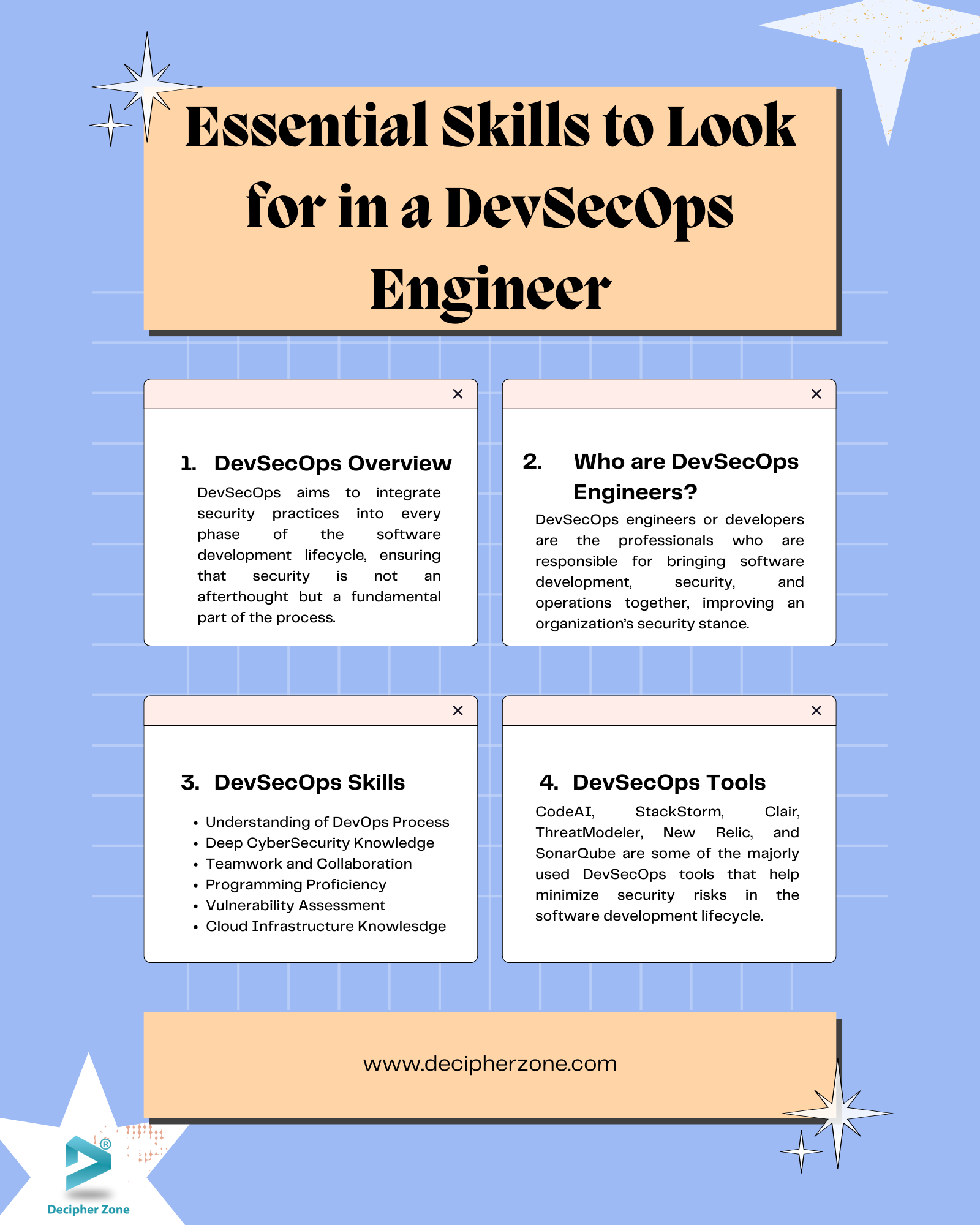Essential Skills to Look for in a DevSecOps Engineer. With today's rapidly changing digital landscape, cybersecurity cannot be underestimated. Organizations must prioritize security as they strive to deliver software and applications at an unprecedented pace. This is where DevSecOps, a fusion of Development (Dev), Security (Sec), and Operations (Ops), comes into play.
DevSecOps aims to integrate security practices into every phase of the software development lifecycle, ensuring that security is not an afterthought but a fundamental part of the process.
To successfully implement DevSecOps practices, organizations must seek DevSecOps engineers with a specific set of skills. In this blog post, we will explore the essential skills to look for in a DevSecOps engineer.
Who are DevSecOps Engineers?
DevSecOps engineers or developers are the professionals who are responsible for bringing software development, security, and operations together, improving an organization’s security stance.
These professionals are skilled at integrating security into the software development lifecycle. They help monitor and identify potential security threats and vulnerabilities and implement robust security strategies to prevent the risk from materializing.
Read: Tips for a Smooth DevSecOps Transformation
This results in data and information technology (IT) infrastructure protection. DevSecOps engineers also spread cybersecurity awareness to the team members while empowering them to build resilient and robust software systems in the shortest possible time.
Read: Best Practices & Tools for DevOps Testing Strategy
That being said, the idea of having DevSecOps developers revolves around training each developer to be a security expert. So, instead of having any hyper-specialized roles, developers can have a fully capable, single role where they learn to program frontend, backend, CI/CD, infrastructure, security, and more.
DevSecOps engineers can work throughout the project lifecycle from design to development, test, and production deployment.
Advantages of DevSecOps
Now that we have a better understanding of what DevSecOps is and who are DevSecOps engineers, let’s check out some of the advantages of implementing DevSecOps in software development. These advantages include:
-
Teams can identify security vulnerabilities during development, rather than after the app has been released when the public is affected and the company's reputation is damaged.
-
Adding security in the CI/CD pipeline also accelerates the feature development and delivery as it allows the development team to find errors and bugs in the system to be resolved before they create havoc in the software.
-
Some other crucial benefits of DevSecOps are potential cost savings, secure team communication, automation testing, easy scalability, improved agility, better product quality, etc.
6 Essential Skills to Look for in a DevSecOps Developer
Here we have enlisted 6 skills that a business should look for in a DevSecOps engineer before hiring them.
-
Understanding of DevOps Process
-
Deep CyberSecurity Knowledge
-
Teamwork and Collaboration
-
Programming Proficiency
-
Vulnerability Assessment
-
Cloud Infrastructure Knowledge

1. Understanding of DevOps Process
Since DevSecOps is built on DevOps, as a DevSecOps engineer it becomes a necessity to have an in-depth understanding of all the processes involved in DevOps.
Without grasping details about DevOps, it would become impossible for DevSecOps engineers to implement security tools into existing CI/CD pipelines, monitor results, or ensure zero vulnerabilities in the software.
2. Deep CyberSecurity Knowledge
As we know the core aspect of DevSecOps is cybersecurity, it goes without saying that a DevSecOps engineer must know the latest techniques of risk assessments, approaches for modeling cybersecurity threats, automated tools, and best practices.
It is also the responsibility of a DevSecOps developer to have updated details of cybersecurity threats for better risk assessment and security integrations.
3. Teamwork and Collaboration
Collaboration between different teams, professionals, and departments acts as the cornerstone of DevSecOps. This also makes it important for engineers to communicate effectively to have insights on security, automation, and possible vulnerabilities.
4. Programming Proficiency
It should not come as a surprise that a DevSecOps engineer should be proficient in programming. They should be able to have a discussion with the DevOps team to work on a vulnerability solution detected in the system.
Some of the most used programming languages they can go for include Java, Ruby, Python, JavaScript, PHP, Ruby, Pearl, etc.
5. Vulnerability Assessment
DevSecOps developers should be aware of conducting complicated vulnerability assessments to detect any issue at an early stage and resolve them with ease.
6. Cloud Infrastructure Knowledge
The rise of on-premise server costs and lack of security resources has led more and more businesses to move to cloud services. Due to this, it becomes essential for DevSecOps engineers to grasp the knowledge of cloud infrastructure and master cloud technologies.
Wrapping it up
So that was all about DevSecOps. We hope that now you have a better understanding of the DevSecOps process and what to look for in a DevSecOps engineer. However, if you still have lingering questions in your mind or want to get a quote to hire DevSecOps developers to build a software app for your business, then contact our IT experts now!
FAQs: Essential Skills to Look for in a DevSecOps Engineer
What skills are needed for DevSecOps?
To become a DevSecOps developer you need to understand the DevOps process, have deep cybersecurity and cloud infrastructure knowledge, know how to work in a team and collaborate, know how to check vulnerabilities, and have programming proficiency.
What is the core of DevSecOps?
The core principle of DevSecOps is to deliver frequent yet small releases using agile methods and automated testing to ensure secure, reliable, and high-performing software development.
What are DevSecOps tools?
CodeAI, StackStorm, Clair, ThreatModeler, New Relic, and SonarQube are some of the majorly used DevSecOps tools that help minimize security risks in the software development lifecycle.

